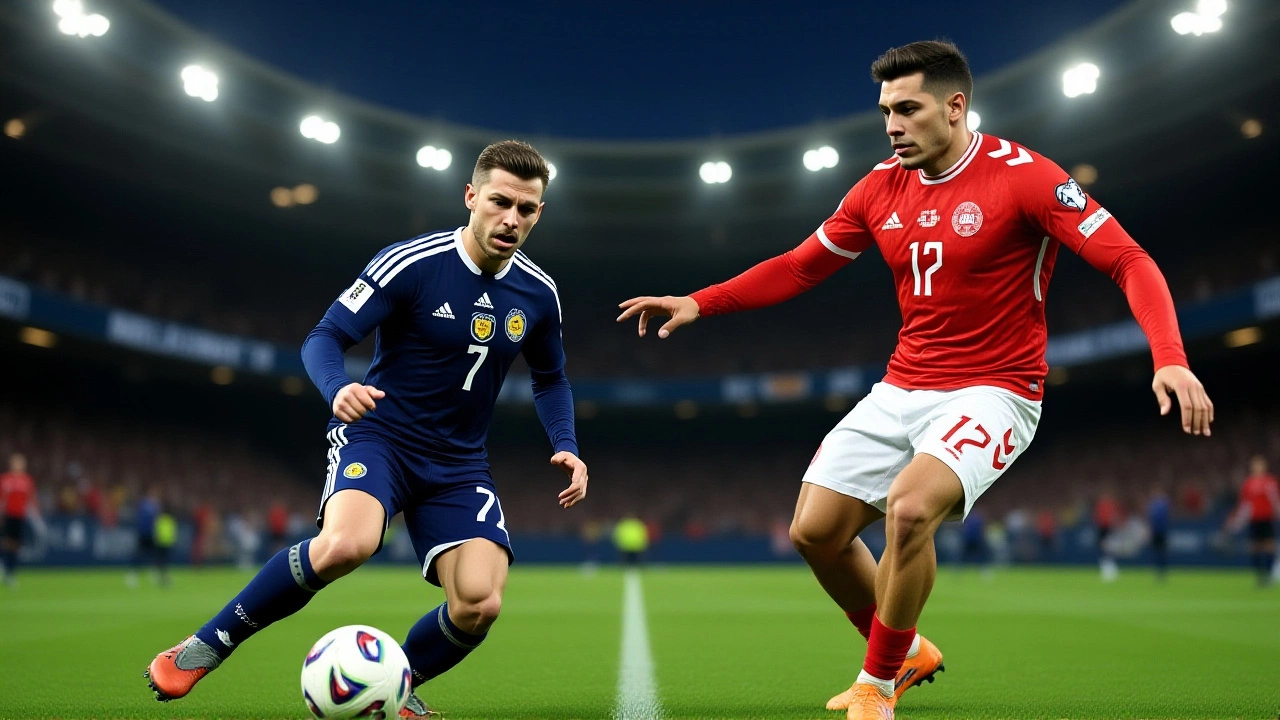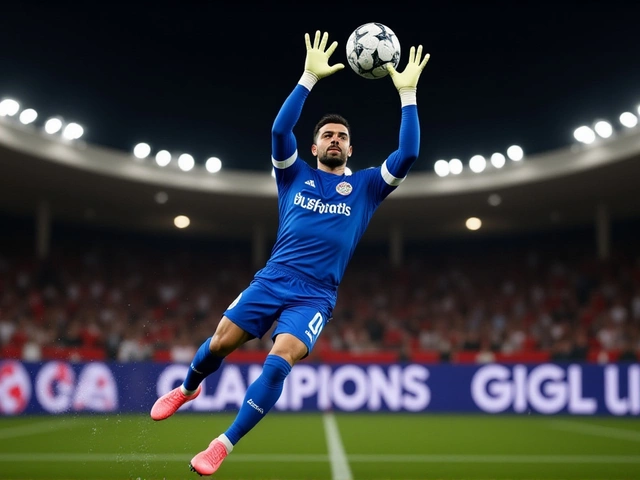
When Joachim Andersen let loose a string of explicit curses during a live TV interview moments after Scotland’s shock World Cup qualification, the world didn’t just hear a frustrated athlete — it heard the raw edge of international football’s emotional toll. The outburst, captured on November 19, 2025, during a pitch-side segment with Danish broadcaster TV2, came seconds after Scott McTominay scored a breathtaking bicycle kick to seal Scotland’s first World Cup appearance since 1998. What followed wasn’t just anger. It was a meltdown broadcast to millions.
How a Bicycle Kick Broke a Nation’s Composure
Denmark had controlled possession for most of the match — the kind of dominance that feels like destiny. But football doesn’t reward control alone. It rewards moments. And in the 87th minute, McTominay, a midfielder often dismissed as a workhorse, launched himself into the air, twisted his body like a gymnast, and sent the ball soaring over the Danish defense. The goal wasn’t just a goal — it was a cultural reset for Scottish football. For Denmark, it was a gut punch. Andersen, visibly trembling as the camera zoomed in, didn’t wait for the interview to begin. He started speaking before the mic was even in his face. "[ __ ] hell, that bicycle kick from McTominay. How the [ __ ] do you defend that [ __ ]?" he snapped, according to the video transcript. "Blasting Scotland’s lucky late smash and grab while Denmark... dominated possession." The words weren’t just vulgar — they were dismissive. As if the beauty of the goal, the athleticism, the sheer improbability of it, meant nothing next to Denmark’s 62% ball control.Scotland’s 28-Year Wait, Denmark’s Sudden Fall
Scotland hadn’t reached a World Cup since 1998. That’s 28 years. Two generations of fans who grew up watching qualifiers end in heartbreak. The last time they qualified, the Soviet Union still existed. Now, in a match played in front of a stunned crowd — likely in Denmark, given TV2’s presence — they punched through. Tierney’s rocket from outside the box. MLAN’s audacious halfway-line lob. And then McTominay’s moment of pure, unscripted magic. For Denmark, the loss was more than a missed tournament. It was a rupture. The Danish Football Association (DBU) had qualified for seven of the last ten World Cups. This time, they didn’t even make the playoffs. The weight of expectation, the pressure of being a consistently strong European side, cracked under the pressure of one improbable finish.
"No Apologies Yet" — The Silence That Speaks Louder
As of November 19, 2025, no official word came from DBU, nor from Scottish Football Association, nor from Andersen’s club, AC Milan. No statement. No apology. No suspension. Just silence. And that silence? It’s louder than the rant. Fans on Twitter and Reddit split hard. One side called it "sore loser vibes" — a man who couldn’t handle losing to a team he’d beaten in the past. The other side argued: "He’s human. That goal felt like a slap. You don’t know what it’s like to lose your dream in 10 seconds." Even Scottish fans, usually quick to celebrate, expressed unease. "We didn’t want to win like this," one tweeted. "We wanted to win with class. Not because someone lost theirs."What This Means for the 2026 World Cup
This isn’t just about two players or one match. It’s about the emotional toll of high-stakes football. The 2026 World Cup will be the first with 48 teams — more pressure, more drama, more moments like this. Andersen’s outburst might become a case study in sports psychology. When does passion cross into toxicity? When does disappointment become unprofessional? McTominay, for his part, has stayed quiet. He’s not the type to tweet back. He’s the quiet captain who lets his boots do the talking. But now, he’s been thrust into a global spotlight — not for his goal, but for the reaction it provoked. That’s the cruel irony of sport.
The Bigger Picture: Sportsmanship in the Age of Viral Rage
We’ve seen this before. Cristiano Ronaldo’s infamous glare after Portugal’s 2018 loss. Neymar’s theatrical flops. But those were individual acts. This was live. Broadcast. Unedited. And it happened right after a historic moment for a nation. Football is supposed to be joy. But when the stakes are this high, joy can turn to grief — and grief can turn to rage. The question isn’t whether Andersen was wrong. It’s whether we, as fans, are ready to forgive the human side of elite athletes.Frequently Asked Questions
Did Joachim Andersen face any disciplinary action after the rant?
As of November 19, 2025, neither the Danish Football Association (DBU), AC Milan, nor FIFA had issued any disciplinary statement. While FIFA’s code of conduct prohibits offensive language during official broadcasts, enforcement typically requires formal complaints — none have been filed publicly. Analysts suggest that unless the rant was deemed racially or personally abusive, consequences are unlikely.
Why did Scott McTominay’s goal trigger such a strong reaction?
McTominay’s bicycle kick was the decisive goal in a match Denmark dominated statistically. For Andersen, it felt like a betrayal of effort — like all the hours of possession, pressing, and control meant nothing because of one moment of brilliance. The goal symbolized Scotland’s long-awaited return to the World Cup, making the loss even more symbolic — and painful — for Denmark.
How significant is Scotland’s qualification for the 2026 World Cup?
It’s historic. Scotland last qualified for the World Cup in 1998 — 28 years ago. During that span, they missed every tournament, including the 2010, 2014, and 2022 editions. Their qualification, secured through the UEFA playoffs, marks the first time since 1998 they’ve reached the finals. For a nation with passionate fans but limited resources, it’s a milestone that could reshape football’s future in Scotland.
Was the match played in Denmark or Scotland?
The exact stadium wasn’t confirmed, but the live broadcast by TV2 — Denmark’s national broadcaster — strongly suggests the match was hosted in Denmark. This aligns with UEFA’s qualifying format, where Denmark was the designated home team for the fixture. The pitch-side interview location, therefore, was likely in a Danish stadium, adding to the emotional weight of Andersen’s outburst on home soil.
What’s the likelihood of this affecting future Denmark-Scotland matches?
If both teams meet again — whether in a friendly or future qualifier — the tension will be palpable. Players will remember this. Coaches may use it as motivation. But football is cyclical. In five years, this moment may be forgotten. Unless Andersen or McTominay cross paths again on the pitch, it’ll likely remain a footnote — unless the media keeps dragging it up.
How did fans react on social media?
The video racked up over 12 million views on YouTube within 48 hours. Twitter trends split between #SoreLoserAndersen and #RespectTheGame. Scottish fans celebrated McTominay’s goal with memes of him as a superhero. Danish fans, however, defended Andersen, calling him "a guy who just lost his dream on live TV." Even the BBC and ESPN ran segments dissecting the emotional toll of international football — not just the goal, but the fallout.





